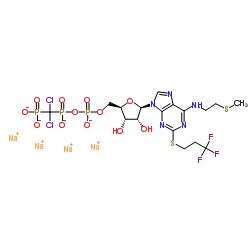163706-36-3
| Name | tetrasodium,[dichloro(phosphonato)methyl]-[[(2R,3S,4R,5R)-3,4-dihydroxy-5-[6-(2-methylsulfanylethylamino)-2-(3,3,3-trifluoropropylsulfanyl)purin-9-yl]oxolan-2-yl]methoxy-oxidophosphoryl]oxyphosphinate |
|---|---|
| Synonyms |
Tetrasodium 5'-O-[({[dichloro(phosphonato)methyl]phosphinato}oxy)phosphinato]-N-[2-(methylsulfanyl)ethyl]-2-[(3,3,3-trifluoropropyl)sulfanyl]adenosine
Cangrelor tetrasodium Adenosine, 5'-O-[[[(dichlorophosphonomethyl)hydroxyphosphinyl]oxy]hydroxyphosphinyl]-N-[2-(methylthio)ethyl]-2-[(3,3,3-trifluoropropyl)thio]-, sodium salt (1:4) UNII-2144G00Y7W Cangrelor tetrasodium (USAN) |
| Description | Cangrelor tetrasodium, an adenosine triphosphate analogue, is a reversible and selective platelet P2Y12 antagonist, with prompt and potent antiplatelet effects. Cangrelor tetrasodium directly blocks adenosine diphosphate (ADP)-induced activation and aggregation of platelets. Cangrelor tetrasodium is also a nonspecific GPR17 antagonist[1][2]. |
|---|---|
| Related Catalog | |
| In Vitro | Cangrelor tetrasodium is the only potent intravenous direct and specific adenosine diphosphate (ADP) P2Y12 receptor antagonist[1]. Cangrelor tetrasodium has pKb of 8.6-9.2 for hP2Y12 receptor[3]. |
| In Vivo | Cangrelor tetrasodium (10 mg/kg) not only significantly decreases BLM-induced release of inflammatory cytokines (PF4, CD40 L and MPO), but also decreases the increment of platelets, neutrophils and platelet-neutrophil aggregates in the fibrotic lung and in the peripheral blood of BLM-treated mice[2]. |
| References |
| Boiling Point | 979ºC at 760 mmHg |
|---|---|
| Molecular Formula | C17H21Cl2F3N5Na4O12P3S2 |
| Molecular Weight | 864.286 |
| Flash Point | 545.9ºC |
| Exact Mass | 862.876099 |
| PSA | 347.26000 |
| LogP | 4.67630 |
| Vapour Pressure | 0mmHg at 25°C |
| Storage condition | -20℃ |

